|
|
|
Sort Order |
|
|
|
Items / Page
|
|
|
|
|
|
|
| Srl | Item |
| 1 |
ID:
103132
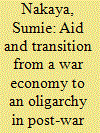

|
|
|
|
|
| Publication |
2009.
|
| Summary/Abstract |
Exclusion and violence persist in post-conflict states, despite international assistance aimed at the demilitarization of politics. Through a field-based study of Tajikistan, this paper argues that aid focuses on economic liberalization, not the implementation of peace agreements, in the initial stage of post-war transition. Such an organization of aid empowers a particular group of elites who have privileged access to state assets at the time of civil war settlement, allowing them to establish institutional frameworks that will consolidate their personal and monopolistic control of resources. This leads to the collapse of power-sharing arrangements, as the incumbent regime seeks to remove wartime commanders and opposition leaders from the administrative apparatus. In Tajikistan, the incumbent regime has also prosecuted many of these former allies and opponents on account of corruption through state agencies established with donor assistance. Aid thus institutionalized exclusion and sustains patterns of violence along civil war divisions, rather than transforming wartime power structures.
|
|
|
|
|
|
|
|
|
|
|
|
|
|
|
|
| 2 |
ID:
105951
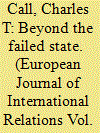

|
|
|
|
|
| Publication |
2011.
|
| Summary/Abstract |
The article advances conceptual alternatives to the 'failed state.' It provides reasons why the concept is deficient, showing especially how counterproductive it is to aggregate states as diverse as Colombia, Malawi, Somalia, Iraq, Haiti, and Tajikistan. I argue for distinguishing among capacity gaps, security gaps, and legitimacy gaps that states experience. Importantly, I show that these gaps often do not coincide in a given country, and that the logical responses to each of the three gaps diverge in significant ways. I offer brief case examples of the logic of response to the gaps and of the tensions that must be managed among them. The article advances the debate over an important and under-theorized emergent concept in global politics.
|
|
|
|
|
|
|
|
|
|
|
|
|
|
|
|
| 3 |
ID:
142274
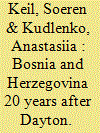

|
|
|
|
|
| Summary/Abstract |
This article will start with an analysis of the Dayton Peace Agreement, and assess to what extent it focused on peace-building, state-reconstruction and democratization. It will provide an overview of major peace-building, state-reconstruction and democratization initiatives by international and local actors in post-war Bosnia. Following the often-presented argument that ‘Dayton is a good peace agreement but a bad blueprint for a democratic state’, the article will ask if the Dayton Peace Agreement has failed in the consolidation of Bosnian statehood and the democratization of the country. In order to do this, an in-depth analysis of the current situation in terms of state consolidation and democratization will be given. The main argument of the article demonstrates that while the Dayton Agreement had some inherent weaknesses, actions by local elites and international state-builders also explain some of the current issues of the Bosnian state.
|
|
|
|
|
|
|
|
|
|
|
|
|
|
|
|
| 4 |
ID:
079376


|
|
|
|
|
| Publication |
London, Routledge, 2007.
|
| Description |
xiii, 283p.
|
| Standard Number |
9780415419475
|
|
|
|
|
|
|
|
|
|
|
|
Copies: C:1/I:0,R:0,Q:0
Circulation
| Accession# | Call# | Current Location | Status | Policy | Location |
| 052688 | 307.76/BOL 052688 | Main | On Shelf | General | |
|
|
|
|
| 5 |
ID:
073269


|
|
|
|
|
| Publication |
London, Routledge, 2006.
|
| Description |
xv, 280p.
|
| Standard Number |
0415702135
|
|
|
|
|
|
|
|
|
|
|
|
Copies: C:1/I:0,R:0,Q:0
Circulation
| Accession# | Call# | Current Location | Status | Policy | Location |
| 051541 | 327.172/MAS 051541 | Main | On Shelf | General | |
|
|
|
|
| 6 |
ID:
075936


|
|
|
|
|
| Publication |
New York, Columbia University Press, 2004.
|
| Description |
202p.
|
| Standard Number |
0231129122
|
|
|
|
|
|
|
|
|
|
|
|
Copies: C:1/I:0,R:0,Q:0
Circulation
| Accession# | Call# | Current Location | Status | Policy | Location |
| 052171 | 341.584/MAR 052171 | Main | On Shelf | General | |
|
|
|
|
| 7 |
ID:
101433
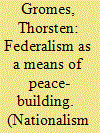

|
|
|
|
|
| Publication |
2010.
|
| Summary/Abstract |
As federalism offers a compromise between a unitary state and secession, it plays a prominent role in agreements on terminating civil wars between ethnically-defined parties to the conflict. This article examines the impact of federalism on peace-building in postwar Bosnia and Herzegovina. It argues that in the chosen case federalism in conjunction with a consociational democracy, peacekeeping troops, and the prospect of integration into the European Union brought about a partial success of peace-building. Although the federal system did not work well, it seems plausible that Bosnia and Herzegovina would be worse off with a unitary state or a partition.
|
|
|
|
|
|
|
|
|
|
|
|
|
|
|
|
| 8 |
ID:
124155
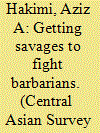

|
|
|
|
|
| Publication |
2013.
|
| Summary/Abstract |
This article focuses on the emergence and evolution of the Afghan Local Police (ALP), a pro-government militia supported by the US military in Wardak Province. The ALP and its previous incarnations have been justified, invoking notions of 'local solutions' and 'cost-effectiveness', as a politically convenient and culturally appropriate measure to supplement broader efforts to counter the insurgency and build up the regular forces. Inspired by the tribal policing concept of arbaki, ALP was envisaged as a short-term local defence force. But the programme has been controversial, and its impact in improving security questionable. In analysing the contestations between different actors involved in the programme, the article demonstrates that the US military's attempt to resuscitate 'age-old traditions' of self-protection proved difficult to realize and produced unforeseen and largely deleterious outcomes. It concludes that far from reflecting the needs of local villagers, ALP was a top-down imposition whose objectives were much narrower than the purported aim of protecting the local population in Wardak.
|
|
|
|
|
|
|
|
|
|
|
|
|
|
|
|
| 9 |
ID:
124153
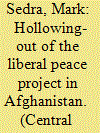

|
|
|
|
|
| Publication |
2013.
|
| Summary/Abstract |
Security sector reform (SSR) has been described as a linch-pin of the liberal state-building and peace-building processes in Afghanistan. The process was originally framed in accordance with the core liberal principles of the SSR model, prioritizing good governance, respect for human rights, sustainability, and democratic civilian control. However, as time passed and security and political conditions began to deteriorate on the ground, the process would gradually revert to a more conventional train-and-equip form, with its core liberal principles stripped away. The slide toward expediency experienced by the SSR process in Afghanistan demonstrates the deeply flawed manner in which the liberal peace project was advanced in Afghanistan. SSR donors became increasingly ambivalent about the human-security objectives of SSR, which were superseded by exigencies of the counterinsurgency, regional security, and domestic pressure for withdrawal. The Afghan experience has raised further doubt about the viability of the orthodox SSR model in conflict-affected countries, already the subject of significant critical debate.
|
|
|
|
|
|
|
|
|
|
|
|
|
|
|
|
| 10 |
ID:
123696
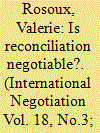

|
|
|
|
|
| Publication |
2013.
|
| Summary/Abstract |
AbstractThe purpose of this article is to question some basic assumptions regarding reconciliation after wars and mass atrocities. Indeed, how can numerous policy-makers, practitioners, and scholars contend that reconciliation is necessary while it is often distrusted and rejected by victims? Are there not cases where calls for reconciliation would prove to be fruitless and even detrimental for peace and/or democracy? To answer these questions, it is worth looking at the interactions between reconciliation and negotiation. Beyond a theoretical interest, this question has a direct impact for practitioners; a better understanding of the issue is actually a sine qua non condition for more efficient interventions. In terms of methodology, this study refers to various examples as illustrative cases (Afghanistan, Rwanda, South-Africa, and the Franco-German case). Its objective is not to capture the complexity of each case study but to determine to what extent reconciliation can be considered as negotiable.
|
|
|
|
|
|
|
|
|
|
|
|
|
|
|
|
| 11 |
ID:
110191
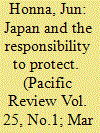

|
|
|
|
|
| Publication |
2012.
|
| Summary/Abstract |
As the second largest contributor to the UN budget, Japan is expected to play a role in implementing the Responsibility to Protect (R2P). Why has Japan been unenthusiastic about actively engaging in the R2P discourse? What is the impact, both domestic and international, of incorporating R2P in its diplomatic agenda? In examining these questions, we first identify different perceptions about R2P among policy-makers and civil society in Japan. We then analyze the post-Cold War politics of diplomatic initiatives concerning Japan's human security doctrine. Third, we assess opportunities (and limitations) of synchronizing R2P with Japanese diplomatic agendas. Throughout the article, we argue that rather than distancing itself from R2P, as typically seen in official statements, actively embracing R2P may provide greater benefits for Japan both in terms of enhancing its diplomatic influence and mobilizing domestic political support.
|
|
|
|
|
|
|
|
|
|
|
|
|
|
|
|
| 12 |
ID:
085355
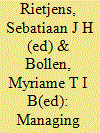

|
|
|
|
|
| Publication |
Aldershot, Ashgate Publishing, 2008.
|
| Description |
xix,257p.
|
| Standard Number |
9780754672814
|
|
|
|
|
|
|
|
|
|
|
|
Copies: C:1/I:0,R:0,Q:0
Circulation
| Accession# | Call# | Current Location | Status | Policy | Location |
| 054013 | 322.522/RIE 054013 | Main | On Shelf | General | |
|
|
|
|
| 13 |
ID:
080180
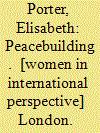

|
|
|
|
|
| Publication |
London, Routledge, 2007.
|
| Description |
xv, 233p.
|
| Series |
Routledge advances in international relations and global politics
|
| Standard Number |
9780415397919
|
|
|
|
|
|
|
|
|
|
|
|
Copies: C:1/I:0,R:0,Q:0
Circulation
| Accession# | Call# | Current Location | Status | Policy | Location |
| 053005 | 327.172/POR 053005 | Main | On Shelf | General | |
|
|
|
|
| 14 |
ID:
100939
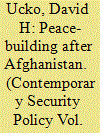

|
|
|
|
|
| Publication |
2010.
|
| Summary/Abstract |
Engagement in various forms of peace-building has increased dramatically since the Cold War, yet what is the future of peace-building in the aftermath of the troubled intervention in Afghanistan? This article argues that while many Western and allied governments will feel chastened by the experience in Central Asia, their impulse to 'do good' internationally will not altogether disappear. Instead, to avoid manage the complexity of future interventions, intervening government may be tempted to reinvoke the traditional peace-building principles drawn from the 1990s - neutrality, consent-based operations, and the minimum use of force. Such a tendency, this article argues, is based on a flawed historical understanding of the experiences of the 1990s and underestimates what it takes to build peace after war. Dissecting the peace-building principles in light of more recent experiences with counterinsurgency, the article explores the full requirements for effective intervention in war-to-peace transitions. It then concludes by discussing what these requirements mean for those states that express interest in peace-building, but whose commitment and capabilities are often found lacking.
|
|
|
|
|
|
|
|
|
|
|
|
|
|
|
|
| 15 |
ID:
053298
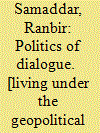

|
|
|
|
|
| Publication |
Aldershot, Ashagate Publishing, 2004.
|
| Description |
x, 385p.
|
| Standard Number |
0754636070
|
|
|
|
|
|
|
|
|
|
|
|
Copies: C:1/I:0,R:0,Q:0
Circulation
| Accession# | Call# | Current Location | Status | Policy | Location |
| 048443 | 327.177/SAM 048443 | Main | On Shelf | General | |
|
|
|
|
| 16 |
ID:
172102
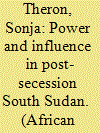

|
|
|
|
|
| Summary/Abstract |
Following South Sudan's secession in 2011, the country faced significant political, social and economic challenges. The country emerged from a long andarduous nation-building journey, including almost 50 years of violent conflict, that would continue after declaring independence. This nation-building process would suffer a significant set-back in December 2013 when the most recent civil war broke out. This article provides a new perspective on South Sudan's nation-building trajectory that tends towards violence and complicates peace-building. It does so by utilising the leadership process approach from the Leadership Studies literature. While popular literature and commentary tends to fault the South Sudanese elite for the current crisis, there has not been a systematic effort to understand the leadership challenge and its role in conflict, peace and nation-building in South Sudan. In this article, South Sudan's nation-building process and its three primary components of (a) identity construction, (b) statehood and (c) collective will and responsibility, are analysed from a leadership perspective, focusing on issues of power and influence. The conclusion is reached that South Sudan's nation-building has been and will likely continue to trend towards a violent process due to a leadership process that lacks mutuality and is founded on insufficient sources of power.
|
|
|
|
|
|
|
|
|
|
|
|
|
|
|
|
| 17 |
ID:
091619
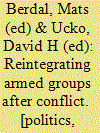

|
|
|
|
|
| Publication |
Milton Park, Routledge, 2009.
|
| Description |
xiv, 226 p. : ill.Hardbound
|
| Contents |
Includes bibliographical references and index.
|
| Standard Number |
9780415476652
|
|
|
|
|
|
|
|
|
|
|
|
Copies: C:1/I:0,R:0,Q:0
Circulation
| Accession# | Call# | Current Location | Status | Policy | Location |
| 054520 | 327.172/BER 054520 | Main | On Shelf | General | |
|
|
|
|
| 18 |
ID:
087308
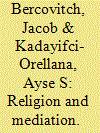

|
|
|
|
|
| Publication |
2009.
|
| Summary/Abstract |
Religion has often been thought of as playing a crucial role in generating conflicts, particularly internal ones. While it may often be a source of conflict, its role in the overall peace process has all too often been overlooked. In this paper we emphasize the importance of religion and religious actors in the process of mediation. We examine the general conditions that facilitate mediation in international relations and assess how much these hold true in the case of faith-based mediation. We find that aspects such as legitimacy and leverage have a major impact on the success or failure of mediation. We examine how these factors manifest themselves in the case of religious mediators, and we show that legitimacy and leverage are still crucial to successful mediation but have a very different meaning and content in the case of religious actors. We explore the consequences of these differences and explain how religious mediation may work best in tandem with the more traditional forms of mediation.
|
|
|
|
|
|
|
|
|
|
|
|
|
|
|
|
| 19 |
ID:
117655
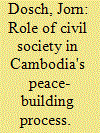

|
|
|
|
|
| Publication |
2012.
|
| Summary/Abstract |
The aid dependence of Cambodian NGOs has resulted in a predominantly donor-driven peace-building process. Notwithstanding some crucial reconciliation initiatives that predate donor involvement and are rooted in local-often Buddhist-traditions, recent key initiatives in the area of transitional justice would not have happened without significant international funding and support.
|
|
|
|
|
|
|
|
|
|
|
|
|
|
|
|
| 20 |
ID:
116130
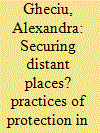

|
|
|
|
|
| Publication |
2012.
|
| Summary/Abstract |
This article explores the dynamics and implications of practices of protection enacted within the framework of the UN-sponsored International Security Assistance Force (ISAF) in Afghanistan. It examines the ways in which those practices challenge established categories in the field of security, and discusses the problems and dilemmas they generate. The article demonstrates that the role played by North Atlantic Treaty Organization - as the lead actor in ISAF - reflects the Alliance's reconceptualisation of the relevant space of security. An analysis of security practices employed by ISAF in Afghanistan reveals that, in spite of statements that stress the unique situation of stabilisation and reconstruction in Afghanistan, ISAF's dual emphasis on inclusion/exclusion (i.e. defeating radical Taliban and Al-Qaeda fighters while also winning the hearts and minds of the other Afghans) echoes in interesting ways of colonial practices of counter-insurgency. Conceptually, one of the most interesting features of ISAF's security practices has been a blurring of multiple boundaries that have long been at the heart of thinking about international politics: domestic/international, military/policing and public/private actors. By shedding light on that process of blurring boundaries, this article provides further evidence in support of the claim made in this special issue: that we are now living in a world in which many of the distinctions that once appeared to be clearly defined and fairly rigid are fast breaking down.
|
|
|
|
|
|
|
|
|
|
|
|
|
|
|
|
|
|
|
|
|